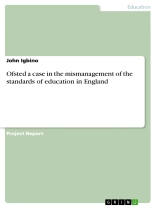Project Report from the year 2014 in the subject Pedagogy – School System, Educational and School Politics, , language: English, abstract: This book reports on a research project which was carried out between 2002 and 2013. The focus of the research was the Office for Standards in Education, Children’s Services and Skills (Ofsted) and its education and training and development programmes for inspectors.
Claims and disputes: The Office for Standards in Education, Children’s Services and Skills (Ofsted) defines itself as the statutory watchdog for the preservation and management of the standard of education in England. And by its own accounts, Ofsted has claimed, firstly, that it is the promoter and upholder high standard of educational achievements, secondly, that it is the bulwark against ‘weak teaching’ and weak leadership, management and governance, and, thirdly, that it is the champion and protector of the interests of the constituents of education in England (Ofsted 2012: 4).
This research does not dispute the fact that the above claims came with the provisions of the Education (schools) Act (1992) and the Education and Inspection Act (2006) and that the Act delegated the statutory duties to inspect, evaluate and judge and report on the standard of education in England to Ofsted. Instead the research is disputing Ofsted’s claims as follows: firstly, the research disputes the extent to which Ofsted has achieved the statutory duties delegated to it under the provisions of the 1992 and 2006 Acts. And, secondly, the research is questioning whether in its current structure Ofsted is fit for purpose and whether Ofsted and a significant proportion of its inspectors have the operational and intellectual capabilities to continue to inspect specific educational remits, and to evaluate and judge and report on the standard of education in England.
Thus the research has advanced the following arguments against Ofsted’s and its inspectors’ capabilities and fitness for purpose: the first argument is that there are incompetent inspectors within the ranks of Ofsted inspectors. The research has found that 30% of practicing Ofsted inspectors do not have the skills and competencies required to successfully achieve Ofsted’s performance criteria for inspectors, particularly in the collection, analysis, evaluation, assessment and interpretation of evidence in the three principal aspects of Ofsted’s judgements. The three aspects in question are ‘Outcomes for Learners, Teaching, Learning and Assessment’ and ‘Leadership and Management’.
The second argument is that there……
Про автора
John Igbino is a retired teacher. Prior to retirement he taught in the Department of Business Studies, Computing and Information Technology at Coulsdon College, Surrey, United Kingdom. He obtained MA from the Open University and Ph D from the University of London. His current research and academic interests include Lifelong Learning; Inclusion in cross-cultural contexts; Cross-cultural pedagogy; Emancipatory and Post-Colonial curricular dialogues; Power, distrust and resistance in educational research, Educational policy ethics and the ethics of educational policy. He is the author of Explorations of Lifelong Learning Ethics (2009) Forum Vol. 51; Number 3. Ethnographic Interviews: cases in the socio-cultural psychology of power (2010), Conference Paper, University of Greenwich.The Act of Changing Education and the new eugenics: an ethical analysis (2011): Conference Paper, University of Greenwich.Intercultural Dialogues: cultural dialogues of equals or cultural dialogues of unequals (2012) in Beasley, T. and Peters, M. eds. Interculturalism, Education and Dialogue: Global Studies in Education, New York, Peter Lang.The meanings of Inclusion in cross-cultural contexts (2012), GRIN Open Publishers, Munich, GMBH. Ofsted: A case in the mismanagement of the standards of Education in England (2014) GRIN Open Publishing, Spidermen: Nigerian Chindits and Wingate's Operation Thursday Burma 1943 – 1944 (2018), Author House UK












